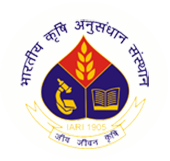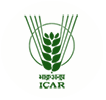 |
भा.कृ.अ.प. - भारतीय कृषि अनुसंधान संस्थान | ICAR-Indian Agricultural Research Institute |
 |
Weather Based Agromet
Advisory Bulletin
Gramin Krishi Mausam Sewa
(Applicable for Delhi and NCR)
Division of Agricultural Physics
ICAR-Indian Agricultural Research Institute
PUSA, New Delhi – 110 012
www.iari.res.in (Weather Advisory)
Year 32, No: - 05/2025-26/Tue. Time: 2.30 PM Date- 15th April, 2025 Weather during current week (From 09th April to 15th April, 2025) Clear weather conditions were observed during the week. Maximum temperature ranged between 34.2 °C and 40.2 °C (weekly normal 36.0 °C). Minimum temperature ranged between 19.4 °C and 24.7 °C (weekly normal 18.7 °C). Relative humidity at 7.21 AM ranged between 65 and 81 percent and that at 2.21 PM ranged between 43 and 65 percent. The average bright sunshine hour during the week was 8.0 hours per day (weekly normal 8.3 hours). The average wind speed recorded was 5.1 km/h (normal 4.7 km/h). Mean evaporation rate during the period was 6.5 mm/day (weekly normal 7.0 mm/day). Wind during morning and evening it was from different directions.
| Weather parameter/Date | 2025-04-16 | 2025-04-17 | 2025-04-18 | 2025-04-19 | 2025-04-20 |
|---|---|---|---|---|---|
| Rainfall (mm) | 0.0 | 0.0 | 0.0 | 0.0 | 0.0 |
| Maximum Temperature (°C) | 40 | 41 | 41 | 40 | 39 |
| Minimum Temperature (°C) | 24 | 24 | 25 | 25 | 24 |
| Average Cloud Cover (Okta) | 2 | 2 | 4 | 2 | 2 |
| Maximum RH. (%) | 65 | 60 | 55 | 65 | 65 |
| Minimum RH. (%) | 35 | 30 | 25 | 35 | 35 |
| Average Wind Speed (kmph) | 10 | 20 | 20 | 20 | 15 |
| Predominant Wind directions | S | NNW | W | W | W |
| Cumulative Weekly Rainfall (mm) | |||||
| Special weather | |||||
Weather based Agromet-Advisories (for the period ending on 20th April, 2025) Advisory based on advices received from the subject matter specialists of agromet-advisory committee: Members of Agro advisory Committee Dr. Ananta Vashisth (Nodal Officer, Agricultural Physics) Dr. Subash Nataraja (Head, Division of Agricultural Physics) Dr. P. Krishnan (Professor, Division of Agricultural Physics) Dr. Deb Kumar Das (Principal Scientist, Agricultural Physics) Dr. B. S. Tomar (Head, Division of Vegetable Science) Dr. Sachin Suresh Suroshe (Project coordinator, AICRP on Honeybee) Dr. Dinesh Kumar (Principal Scientist, Agronomy) Dr. P. Sinha (Principal Scientist, Plant Pathology) Dr. A.K. Singh (Principal Scientist and Incharge, CATAT)